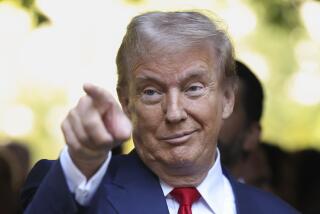Democrats: the New Protectionists : Their Positive Issue in Tatters, They March to a Siren Song
When the House of Representatives passed the trade bill with the so-called Gephardt amendments in April, I had a sensation of the highest historic irony. Here was a party for which free trade had been a central and consistent doctrine for more than 150 years recanting one of its fundamental tenets. The irony was compounded by the fact that the author of the punitive provisions in the bill, Rep. Richard A. Gephardt (D-Mo.), was closely associated with his party’s last effort to stave off the embrace of protectionism--the briefly fashionable concept of industrial policy.
Industrial policy worked its way onto the political agenda after the victory of Ronald Reagan in 1980. The Reagan triumph was the occasion for an orgy of Democratic soul-searching, catharsis and political self-examination virtually without modern parallel.
One recalls the anguished or indignant articles about the Democrats being a party without ideas, a ramshackle structure of interest groups in search of a unifying purpose. The pages of the New Republic, the New York Times Sunday Magazine and other outlets for Democratic grief therapy were full of them. The Republicans had Reaganomics and the Democrats had the moldering legacy of the New Deal.
Just about that time some bright academic economists were popularizing a complex of ideas that ultimately took the rubric of “industrial policy.” It was a term that was often bafflingly imprecise but as delightfully protean in its definitions as the “American dream” or “social justice”--a half-dozen ideas resting somewhat uneasily on a single assumption.
That assumption was that the economy of the United States was undergoing a process of “de-industrialization,” that a decrepit and obsolete manufacturing sector was no longer competitive with the more up-to-date plant and equipment of our major trading partners, but that the service sector of the economy showed signs of great vitality. What troubled liberal Democratic economists was that the transition from an industrial economy to a service economy was unfolding chaotically and would exact a terrible social cost. Workers displaced from manufacturing jobs could not readily be redirected to the service economy or to high-technology jobs without retraining and relocation.
What to do about it? The Democratic thinkers who emphasize the need to preserve an industrial capacity argued for the creation of an industrial-development bank along the lines of the Depression-era Reconstruction Finance Corp.--a bank that would make loans for factory modernization, especially in industries that had been “targeted” by their foreign counterparts. Steel and automobiles were two areas that seemed particularly vulnerable to foreign competition.
For one group of Democrats the development bank was the very heart and soul of industrial policy. For others, the so-called neo-liberals with weaker ties to organized labor, the emphasis was on beating an orderly retreat into services and high technology with programs of job retraining and other forms of “adjustment.” Many of the neo-liberals would have been happy with an economic-strategy council modeled on the Japanese Ministry of International Trade and Industry, but without its regulatory powers.
For all its vagueness and the fact that it was subject to different interpretation, industrial policy was an essentially positive doctrine. There was a recognition that American management had become languid and shortsighted, that our workers had become complacent and indifferent to quality, and that the solution to the aggressiveness of international competition lay in mending our own ways, not in punishing our economic rivals. A few minor features of industrial policy were written into law and some of its major provisions are still kicking around, but it was largely discredited.
Most of the mortal wounds were inflicted by Democrats themselves. The labor unions became impatient with what they saw as tepid, halfway measures and began to clamor for outright protectionism. President Reagan heaped scorn on the idea of managing an industrial transition as just one more example of the Democrats’ refusal to let the hygienic forces of the market purify the economy. By 1984 the phrase had passed out of political usage, and by the time of the 1986 congressional elections the bees of trade retaliation were out of the hive and there was no getting them back.
Perhaps the apparent migration of the Democrats to protectionism is just one more example of the utter irrelevance of even the most hallowed elements of party doctrine to modern politicians and the understandable opportunism of candidates who need easy solutions to offer troubled voters. Vowing to slap restrictions on foreign products is a better centerpiece for a stump speech than tiresome calls to cut the federal deficit or appeals to foster more rapid economic growth overseas; it is certainly less demanding of voters’ intellects.
Some Democrats in Congress will remain true to the precepts of their party and resist the siren song of trade restrictions, but in the crowning irony it may be that old Democrat, Ronald Reagan, who prevents the party once associated with free trade from the fatal step of writing into law the abominable policy of protectionism.
More to Read
Get the L.A. Times Politics newsletter
Deeply reported insights into legislation, politics and policy from Sacramento, Washington and beyond. In your inbox three times per week.
You may occasionally receive promotional content from the Los Angeles Times.










